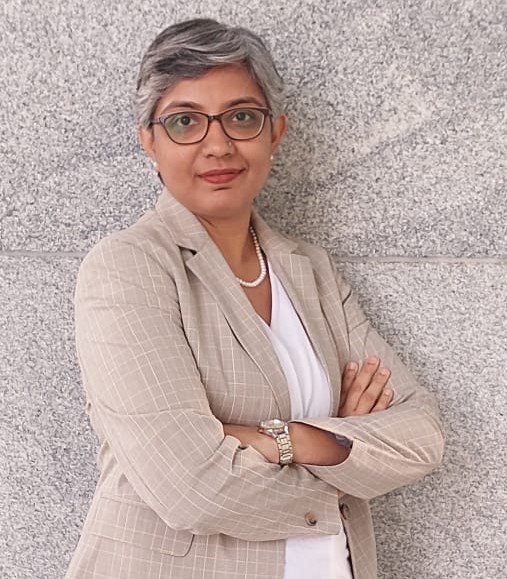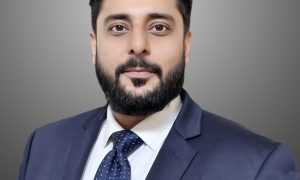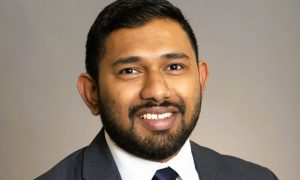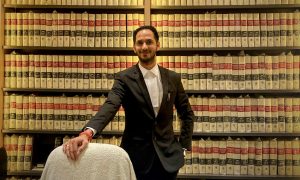This Interview has been published by Pragya Chandni and The SuperLawyer Team

Could you share a bit about your journey into the legal profession, particularly what inspired you to pursue a career in law and how your background in psychology has influenced your legal acumen?
This question is very close to my heart and in its answer lies my firm belief that ‘God’s plan is always better than yours’. I am an accidental lawyer and have never even dreamed of becoming one. I was an absolute introvert in my teens. I was on the verge of getting my bachelor’s degree with a major in psychology but was unsure how to transition that knowledge into a career. Back then, I was terrified by the thought of interacting with people. There were also financial constraints. One day while taking a random stroll in the college lobby, I saw a notice of admission to the evening law degree program run by my college. It was a 3 year program, with no requirement of CLAT and the fee was also very nominal. I was always very much inclined towards reading and had an analytic mind. Piles of books never scared me rather, I found solace amidst them. I have spent more time at the library than at the lectures. The legal profession is always considered as a noble and respectable profession. So, it ticked all the boxes for me.
Within 2-3 years of working as a lawyer, I really started enjoying my work. As a lifelong psychology student (it is still my favorite subject), I am aware of my personality traits, such as an eye for detail, logical thinking, understanding of human behavior, convincing power, and excellent listening and empathy, all that psychology has taught me. These traits are equally, if not more, required to be a competent lawyer. By then, I had also realized that litigation is not something I would not like to do on a daily basis, and I have a knack for good writing skills; thus, I started focusing on documentation, contracting, and written opinions.
With your extensive experience across diverse industries such as education, oil and gas, retail, and real estate, could you highlight some key challenges you’ve faced and how you navigated them, especially considering the varied regulatory landscapes of these sectors?
In the corporate world, legal and regulatory compliance are like two sides of the same coin. Lawyers typically deal with laws and contracts, while compliance officers ensure that a company follows industry rules. Inhouse lawyers handle both by balancing what’s legally required with what’s needed to keep the business running smoothly. They stay ahead by knowing the laws inside out and understanding the operational dynamics of the industry they cater to. Working closely with operation teams and advance planning helps the company avoid or at least anticipate issues and stay on track. In-house lawyers act like guides so businesses can focus on sales, customer delight, production or R and D but within the corners of the laws and regulations.
I will put retail and real estate in the same bucket as retail highly depends on real estate availability. In India, we celebrate and are proud of our ‘Unity in Diversity; approach, but ask this to a lawyer handling PAN India real estate title due diligence! There is a lot of dependency on local languages and systems (or its absence) for maintaining land/revenue records at government offices and local municipal laws. When you started the project, the area was under gram panchayat, and by the time the project was complete, the exact location would have fallen within the municipality’s limits. Additionally, you must understand the operations in detail to ensure that landlords give you the required leeway to utilize the property efficiently. Negotiating with different categories of landlords and developers has honed my negotiation skills.
I have learned the importance of regulatory aspects in the day-to-day functioning of the legal department during my stint in the oil and gas sector. Oil and gas is an absolutely regulated sector with a monopoly of PSUs. There is limited scope for private or international companies. The organization I was working for is a French conglomerate. So the regulatory requirements of India and as well as that of the parent entity’s country were also required to be met strictly, in addition to the best of corporate governance policies. Your prices are regulated, your territories are marked, you have logistic challenges as the oil exploration fields are situated at particular shores, your hands are tied as you swear by ABAC regulations and FCPA, there are sanctioned countries, and so on. I have learned how to build contracts and draft policies while keeping all these in mind.
Another interesting experience is in education, which still amazes me. In India, education is a matter of a concurrent list. It means both the state and central governments will try to regulate the sector. With so many states and so many political parties driving the political scenarios in India, we seldom have state and central policies aligned on concurrent lists matters. In some states, the RTE (Right to Education) Act is taken very strictly; in others, you can maneuver around it. Some states welcome private self-funded players to boost the availability of high-class educational institutions in the states, while others prefer control at the stake of quality and feasibility. With approximately ¼ of our population between the ages of 6 and 16 and the growing income of the middle and upper-middle-class population, there is a huge demand for good quality education providers, attracting many PE and VCs to invest in education. So, suppose you are the legal person for a company having PAN India operations in school, in that case, you can imagine the number of state-specific regulations to keep track of while advising on legal matters from a centralized office!
As the Head of Legal for Manipal Academy of Higher Education, you mentioned restructuring the legal team and enhancing skill development. Can you walk us through some of the strategies you employed to achieve this and the outcomes you observed?
Life in metro cities and small towns is very different, and these differences are evident due to their different levels of exposure in terms of competitiveness, training, motivation, aspirations, and complex work scenarios. The nature of an organization (i.eMNCs, VC-backed Companies, start-ups, and not-for-profit organizations of different sizes ) impacts its culture, and culture is all about people. What works in metros or big cities may not (I would say ‘will not’) work in small towns. You have to manage with the existing resources, and you will not get new resources easily.
The restructuring of the legal team was spearheaded with a focus on clearly defining roles and expectations for both internal and external stakeholders. Significant time was invested in training them on negotiation skills, contract drafting, and legal communication. Assistance was provided to existing teams in understanding the operations and business aspects of the sector, associating the legal aspects and their impact, which has aided in understanding the value of their work.
I swear by templates, checklists, & SOPs, streamlining legal processes, which have been my go-to tools at MAHE as well, and the team and other stakeholders are pleased with these toolkits.
Standardization and process enhancement seem to have been pivotal in your role at MAHE. How did you go about developing templates, checklists, and SOPs, and what impact did these initiatives have on the efficiency and consistency of legal processes?
In the role of an in-house lawyer, I would like to prioritize standardization and process improvement to enhance the productivity of the legal team. Commencing with a thorough examination of existing legal workflows, recurring tasks and areas of inefficiency were identified through collaborative discussions with team members and stakeholders. Tailored templates, checklists, and SOPs were crafted based on these insights to address these pain points, with a focus on streamlining processes, reducing errors, and ensuring compliance. Throughout this process, feedback and input were actively sought from team members, both external and internal to provide practical, user-friendly solutions. Comprehensive training sessions and personalized hand holding were conducted to ensure effective adoption and user comfort.
Following implementation, key metrics such as negotiation time and success, as well as requester feedback, were closely monitored to assess the impact of these initiatives on efficiency and consistency. Significant improvements were noted in turnaround time, error rates, and compliance levels. The standardized processes implemented not only streamlined workflows, enabling quicker task completion and freeing up time for higher-value work, but also fostered consistency in executing legal tasks across the team, thereby enhancing overall compliance and risk management.
Given your focus on the education sector, could you elaborate on the unique challenges and opportunities you’ve encountered in this industry, particularly regarding M&A deals, post-merger integration, and regulatory compliance?
In education, navigating the regulatory and compliance landscape presents a distinctive set of challenges and opportunities. With education falling under the concurrent list, governance involves coordination between multiple authorities, adding complexity to regulatory compliance. While the sector is socially impactful, profit-making is restricted, necessitating a delicate balance between financial sustainability and delivering quality services. The surge in M&A activity, driven by interest from private equity and venture capital firms, reflects evolving market dynamics, particularly with the rise of Ed-tech post-pandemic. However, traditional brick-and-mortar K-12 schools continue to uphold their significance, requiring continuous adaptation to compete with digital alternatives.
Establishing or expanding educational institutions often involves substantial real estate investments, which, coupled with more extended gestation periods, pose financial challenges. Moreover, post-merger integration presents its own set of hurdles, given the absence of nationwide standards and the varied regulatory frameworks across states. Many institutions begin as philanthropic ventures, evolving over time under the influence of passionate founders or promoters and their younger generations wanting to encash on brand and legacy, further complicating the integration process.
In summary, the education sector offers immense opportunities for growth and impact. Still, success hinges on effectively navigating the regulatory landscape, adapting to market shifts, and executing strategic M&A deals with diligence and foresight.
In your career, you’ve been involved in forming and mentoring legal teams from the ground up. What qualities do you look for when assembling a legal team, and how do you foster a collaborative and productive work environment within it?
My first question in any interview for a legal position or when I meet a law student is, “What made you choose law as your career choice ?” The answer to this lets me into their perception of as well as their expectations from this profession. So, for me, their ‘Why’ is very important. Another critical and non-negotiable quality is a willingness to be a lifelong learner- of new skills, not only new rules and regulations but also new subjects beyond law. Law is such a vast area that one should never be complacent or consider oneself a law expert.
For most of my career, I have worked in large organizations and across sectors, so being a team member and working in groups is another aspect I will look into.
Along with legal acumen like good written communication and the ability to summarize or comprehend legal texts, a successful in-house legal person must have a basic understanding of the practical aspects of business and operations to evaluate any document or situation from multiple angles.
I would eat, sleep, and breathe law and amongst those lucky people on the earth who love what they do and do what they love, so I don’t need a heavy dose of motivation daily. Still, different persons have different aspirations and motivations. So, I ensure that my team is clear regarding mutual expectations. Clarity and openness in communication are vital for successful teamwork. As stated earlier, training, handholding, and standardization ensure consistency in the output, and I insist on continuous and 360-degree feedback. I am very comfortable in delegation with empowerment and hate micromanaging things. Most importantly, we have a lot of fun banters, teasing, and snacking going around all day amidst heavy negotiations and focused reading sessions, so there is never a dull day at work.
As someone passionate about advancing legal education, what initiatives have you undertaken to contribute to the development of young lawyers, both within your organization and beyond?
I am seriously jealous of today’s generation for the sheer amount of availability of resources and diverse opportunities. But then, there is also a problem of plenty and confusion created due to multiple options. So, they need proper guidance to capitalize on the right kind of opportunity and information. So at every available opportunity, I love to reach out to students and budding lawyers to understand their academic challenges, needs, and wants. I talk to them to identify what they find exciting and boring and learn about their misconceptions and fears. This kind of conversation has a dual advantage for me – it fuels my curious mind, lets me know recent trends and future expectations, and helps me to be relevant while hiring and mentoring young lawyers. I volunteer for lectures in law schools and webinars for the transition from ‘campus to corporate,’ different career options for lawyers, practical contract drafting, and the like.
For my teams, I identify and ask for their specific training needs for skill enhancement and give them the desired resources. I have always been an early adopter of technology, so I encourage using digital tools such as CLM, digital signature, and chat-gpt (with much caution). My funda is one size does not fit all, and thus, I customize based on the personality and needs of an organization.
Lastly, drawing from your rich experience, what advice would you offer to fresh graduates aspiring to pursue a career in law, especially those interested in making an impact in diverse industries like education and beyond?
‘Stay hopelessly curious and be an avid learner,’ understand business, and think like a lawyer but look beyond the law. Take calculated risks, and don’t settle for one area or organization for safety; experiment in your early years. Develop transferable skills even as a lawyer, such as due diligence, negotiation, policy-making, legal auditing, etc., and remember to keep asking yourself, ‘Why did you choose to become a lawyer?’ The answer may vary over time, but there must be a clear answer every time.
Get in touch with Mirul Bhavsar-

























